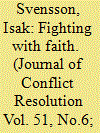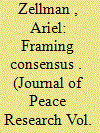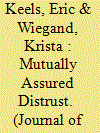|
|
|
Sort Order |
|
|
|
Items / Page
|
|
|
|
|
|
|
| Srl | Item |
| 1 |
ID:
079923


|
|
|
|
|
| Publication |
2007.
|
| Summary/Abstract |
A growing literature has started to explore the relationship between religious dimensions and the escalation, duration, and termination of armed conflicts. This study explores the conditions for negotiated settlements. The author argues that if the belligerents' demands are explicitly anchored in a religious tradition, they will come to perceive the conflicting issues as indivisible, and the conflict will be less likely to be settled through negotiations. Utilizing unique data on the primary parties' religious demands and identities, all intrastate conflict-dyads in the Uppsala Conflict Data Program (UCDP), 1989-2003, are examined. The study finds that if governments or rebel-groups have made explicit religious claims, these conflict-dyads are significantly less likely than others to be terminated through negotiated settlement. By contrast, whether the primary parties come from different religious traditions does not affect the chances for negotiated settlement
|
|
|
|
|
|
|
|
|
|
|
|
|
|
|
|
| 2 |
ID:
140081


|
|
|
|
|
| Summary/Abstract |
International territorial conflicts are frequently characterized by political recourse to narratives of nationalist entitlement, stifling conflict resolution by raising domestic audience costs and discursively limiting bargaining flexibility. Conflict incentivizes elite employment of such claims precisely because security threats and fear of violence heighten popular resonance of adversarial collective identity frames. This article argues, however, that consensus mobilization behind nationalist territorial claims is highly dependent upon the particular narratives elites select to justify them. Employing controlled individual-level experiments administered to diverse populations in Israel, it demonstrates how exposure to competing narratives of homeland, security, economic prosperity, and settlement impacts support for control of East Jerusalem, the Golan Heights, and the West Bank. Although indivisible claims to ‘United Jerusalem’, the Golan, and West Bank settlement blocs and strategic highlands are generally considered popular consensus issues in Israel, only particular narratives trigger consensus mobilization behind each. Some narratives even encourage conciliatory policy attitudes against such appeals. As a democracy embroiled in multiple enduring territorial disputes, analysis of the Israeli case contributes to understanding of the limits and political consequences of elite rhetoric. Demonstrating the affinity between narrative frames and popular policy preferences, this article also lends insight into the intersubjective beliefs that drive mass support for nationalist territorial claims.
|
|
|
|
|
|
|
|
|
|
|
|
|
|
|
|
| 3 |
ID:
175347


|
|
|
|
|
| Summary/Abstract |
Within the study of intrastate armed conflicts, many scholars rely on a bargaining model when explaining why some civil wars are intractable. Primarily, scholars posit that commitment problems represent a key barrier to settling conflicts through negotiations. Yet, some civil wars are more easily resolved than others. If commitment problems are a universal feature of civil wars, what explains why commitment problems are more salient in some conflicts as compared to others? We argue that ideological differences between combatants enhance commitment problems in civil wars. Assuming that ideology is used by combatants to generate support, concessions that violate the ideological goals of each side may alienate supporters. With extreme ideological polarization, concessions may be viewed as relative as opposed to absolute, making it difficult for either side to credibly commit to offer concessions. To test these claims, we quantitatively examine the duration and outcome of all intrastate conflicts from 1975 to 2011.
|
|
|
|
|
|
|
|
|
|
|
|
|
|
|
|
|
|
|
|
|